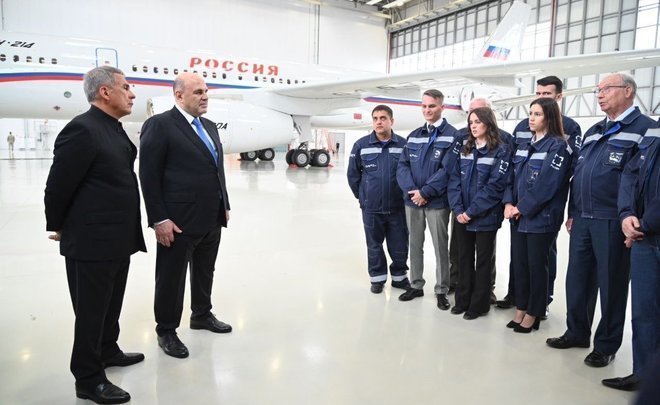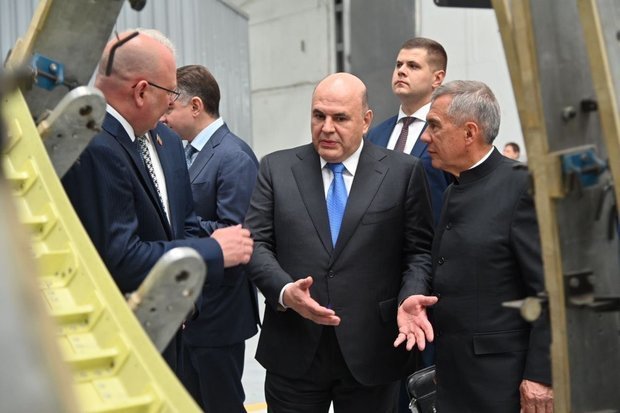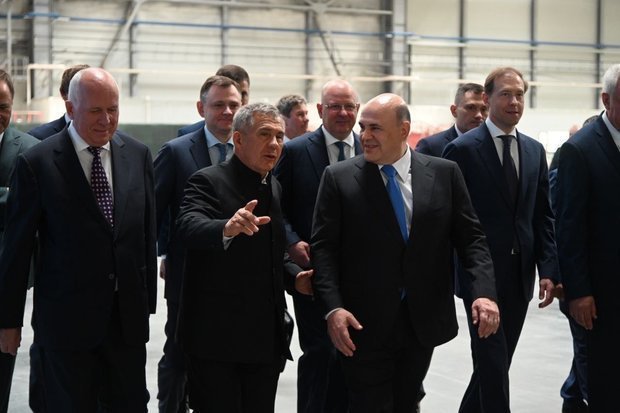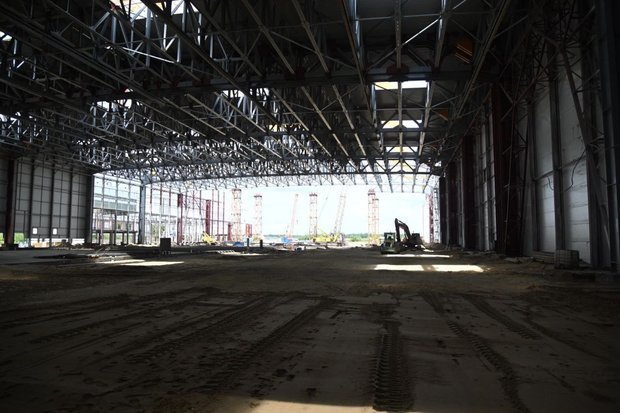Mikhail Mishustin: ‘Demand for Tu-214 is higher than just ten planes a year’

The Kazan Aircraft Production Association is preparing to double the annual production of Tu-214 passenger aircraft — up to 20 planes, starting in 2027. On 22 June, Russian Prime Minister Mikhail Mishustin, during a visit to the enterprise, approved the modernisation programme of the second stage with a total cost of 83,6 billion rubles, which will make it possible to reach new rates of machine assembly. The government of the country decided to allocate half of this amount — 41,8 billion rubles — from the National Welfare Fund. By 2032, Kazan can build 156 airliners — at least, this forecast was presented by the team of Tupolev PJSC. Read the details in the material of Realnoe Vremya.
20 planes a year now!
On 22 June, Mikhail Mishustin visited the Kazan Aircraft Production Association, where he held a meeting on aircraft construction and also met with employees of the enterprise. Together with him, Rostec CEO Sergey Chemezov, Minister of Industry and Trade Denis Manturov and Finance Minister Anton Siluanov flew to Kazan. The main issue of the meeting was the programme for the development of the domestic aircraft industry and the provision of Russian carriers with domestic vessels. As it turned out, the most significant adjustments were made to the civil aircraft construction programme at the Kazan aircraft plant.
“From 2025, the plant was supposed to produce 10 aircraft a year, but the demand for such equipment is much higher. We saw the production today, and I think that the Kazan aircraft plant will cope with a large volume. I would like to inform you that, in agreement with the president of Russia, 41,8 billion rubles are allocated from the National Welfare Fund for this project. This decision will make it possible to carry out technological equipment, construction, and reconstruction of storage facilities for the launch of 20 aircraft a year at the fastest pace today," Mikhail Mishustin stated.

Sukhoi Superjet preparing for flight
Before that, he gave a brief overview of the state of the aviation industry. According to the prime minister of Russia, the government pays special attention to the aircraft industry. The key issue is to reduce dependence on imported components. According to him, MC-21 and Sukhoi Superjet are undergoing additional tests.
In the near future, Sukhoi Superjet with a fifth-generation engine will go on a flight. In total, the industry will receive 40,5 billion rubles this year and the same amount — next year. 90 billion rubles will be allocated for subsidising R&D, of which 37 billion — this year. The industry is to build over 1,000 aircraft.
The Russian prime minister emphasised that the Kazan aircraft plant is to produce 10 aircraft a year within a year and a half. Reliability is not in doubt among pilots, he stressed.

Tupolev: demand for 156 aircraft by 2032
Managing Director of Tupolev PJSC Vadim Korolev presented the modernisation programme of the second stage of the Kazan aircraft plant, prepared in connection with the doubling of the annual production of aircraft. According to him, the demand for the Tu-214 will be 156 aircraft by 2032.
“To launch the production of 20 aircraft, a programme has been developed for the modernisation of the enterprise, import substitution of production and a system of after-sales operation," he began his report.
The need for Tu-214 aircraft is 156 units for the period up to 2032. “There are firm contracts for 20 aircraft, agreements of intent have been signed for 67 aircraft, and there are applications from potential customers for 61 aircraft," Korolev reported at the meeting. Currently, the Tu-214 consists of 87% Russian components, in the future the aircraft is planned to be made entirely from domestic parts, he clarified.
According to him, the renewal of capacities has begun this year, when, by order of the federal authorities, the plant received 12 billion rubles in February of this year. “The events are included in the development programe and are funded taking into account the government decree of February 12 of this year (Resolution No. 298). It provides for the purchase of airfield equipment, digitisation of design documentation, and implementation of R&D on import substitution of Tu-214 aircraft equipment. Besides, Rostec provided a loan of 1,2 billion rubles. 83,6 billion rubles are required to carry out the second stage of modernisation," he said.
Of this amount, 13 billion rubles will be allocated for the purchase of modern machining machines, 4 billion — for the manufacture of modern automated lines for the final assembly shop. The largest amount, 22,7 billion, will be allocated for the construction and reconstruction of more than 100 thousand square metres of new workshops: “This is the centre of machining, final assembly, warehouse management.” Besides, 10 billion should be allocated for after-sales service and purchase of simulators. Another 23 billion will be spent on expanding the capacities of enterprises participating in cooperation.
The rais of Tatarstan, Rustam Minnikhanov, added that a large assembly building will be commissioned this year, which will make it possible to start production of 20 aircraft earlier than 2027.

Rostec to issue bonds to finance KAPO
However, there is no funding for the entire programme for 83,6 billion rubles yet. At the suggestion of the Government of the Russian Federation, Rostec will issue bond loans for up to 15 years. “The further funds that are needed, that is, about 42 billion more, may be Rostec's bond loans, which can be issued for up to 15 years with a coupon yield of about 1,5% per annum to finance the project," Mishustin added. According to him, 27,4 billion rubles will go to the technological equipment of production, 22 billion rubles — for the reconstruction of warehouses, 10 billion rubles — for after-sales support. Aeroflot CEO Sergey Alexandrovsky, who, in fact, will operate the Kazan aircraft, made two remarks:
“We, as one of the largest customers, would like to discuss several issues that are critically important for commercial operators," he said. “Firstly, to extend the warranty period from the current 18 months to 48 months, as with most foreign airliners. Secondly, to strengthen the after-sales service programme and expand the fleet of simulators for pilot training. The company should have a programme for improving aircraft, taking into account the volumes that are currently being launched.
“We don't just have to build airplanes. Today, it is necessary to build a full life cycle of construction, operation and implementation — such projects should be planned comprehensively at once. It is necessary to think in advance how to bring the aircraft to the market," Mikhail Mishustin concluded at the end of the meeting.